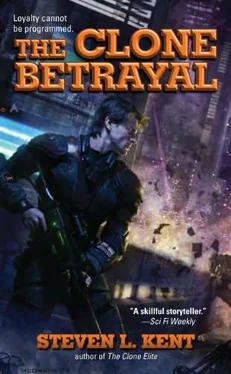Steven Kent - The Clone Betrayal
Здесь есть возможность читать онлайн «Steven Kent - The Clone Betrayal» весь текст электронной книги совершенно бесплатно (целиком полную версию без сокращений). В некоторых случаях можно слушать аудио, скачать через торрент в формате fb2 и присутствует краткое содержание. Жанр: Боевая фантастика, на английском языке. Описание произведения, (предисловие) а так же отзывы посетителей доступны на портале библиотеки ЛибКат.
- Название:The Clone Betrayal
- Автор:
- Жанр:
- Год:неизвестен
- ISBN:нет данных
- Рейтинг книги:5 / 5. Голосов: 1
-
Избранное:Добавить в избранное
- Отзывы:
-
Ваша оценка:
- 100
- 1
- 2
- 3
- 4
- 5
The Clone Betrayal: краткое содержание, описание и аннотация
Предлагаем к чтению аннотацию, описание, краткое содержание или предисловие (зависит от того, что написал сам автор книги «The Clone Betrayal»). Если вы не нашли необходимую информацию о книге — напишите в комментариях, мы постараемся отыскать её.
The Clone Betrayal — читать онлайн бесплатно полную книгу (весь текст) целиком
Ниже представлен текст книги, разбитый по страницам. Система сохранения места последней прочитанной страницы, позволяет с удобством читать онлайн бесплатно книгу «The Clone Betrayal», без необходимости каждый раз заново искать на чём Вы остановились. Поставьте закладку, и сможете в любой момент перейти на страницу, на которой закончили чтение.
Интервал:
Закладка:
Officially, our camp was part of Fort Bliss. The inmates, however, called it “Clonetown.”
Clonetown was not large; but that did not matter, there were not all that many survivors of the battle for New Copenhagen. Of the nine hundred thousand cloned troops sent to defend New Copenhagen, only thirty thousand survived. At some point, somebody told me there were another three hundred thousand clones that had remained on Earth in support roles.
The Navy still had multiple millions of clones serving in its fifteen deep-space fleets, but nobody worried about clones in space. They manned the battleships, frigates, cruisers, and carriers that had once relied on a pangalactic transportation system known as the Broadcast Network to travel between occupied solar systems. With the Network down, deep-space clones were even less of a threat than unarmed clones interred in relocation camps. We were merely unarmed and locked up, they were trapped billions of miles from Earth.
I spent my first month in Fort Bliss before finding out what the Pentagon planned to do with us. There were plenty of rumors, most of which began with a line like, “I got a friend who heard General Glade say …” Of course, none of the rumors matched up. When it comes to gossip, Marines act like little old ladies in a sewing circle.
The most popular rumor was that the Army had built Clonetown on top of a bomb. Some general would explode that bomb as we slept, solving the nagging problem of what to do with us once and for all. Everyone agreed that the rumor was a joke, but that didn’t stop groups of inmates from digging holes around camp. They didn’t find any bombs, but they did come across an abandoned honey bucket burial site. The air reeked for a week after that.
I didn’t get the feeling that Congress or the Pentagon wanted us dead; they just wanted us to fade away.
CHAPTER SEVEN
I sat alone on a row of aluminum bleachers overlooking a parade field on which squads of newly recruited natural-born soldiers drilled. I paid no attention to the platoons doing jumping jacks and running. Instead, I concentrated on squads learning how to fight with pugil sticks. I had endured these same drills nine years and two wars ago. Boot camp was tougher back then; we had veteran drill instructors. The natural-born DIs drilling these boys were fresh out of diapers themselves.
Sergeant Major Lewis Herrington quietly came up and sat on the bleachers behind mine.
I would have demanded a salute from anyone else. As the highest-ranking guest of the Clonetown detention facility, I had that right; but Herrington and I were members of an exclusive club. He and I had both survived the final battle of the Avatari war, a claim only four people in the entire universe could make. He did not need to salute.
“How do they look, sir?”
“Like conquering heroes,” I said.
As natural-borns, the five thousand recruits on the field came in all shapes and sizes. Many of them did not fit well into their government-issue tees and shorts. There was a time when one size fitted all enlisted men because every enlisted man came from the same helix. Some clones packed on a few extra pounds in the orphanages and some reported to boot camp looking skinny. I had five inches on everybody going through boot camp, but that’s how things go when you are a one-of-a-kind clone.
Herrington, who had just turned fifty, had more white hair than brown. He was the oldest inmate in our little camp, but he was bred in a laboratory and born in a tube like the rest of us. We were all created for the same calling, to serve in the military. He had gone through boot camp thirty years before me, but he saw what I saw—substandard training.
Some of the natural-born recruits on the parade ground looked like they could fight, but most of them looked better suited for writing poetry. Unlike us, they grew up civilians, never suspecting they might one day be drafted. Many of them were clearly less than enthusiastic about their new life in the military.
Perhaps as many as a hundred soldiers had paired off for sparring with pugil sticks. In one match, a tall, lanky kid came out swinging against a short, chubby opponent. The short one looked like he wanted to drop his stick and beg for mercy.
The whole point of skirmishing with pugil sticks was to simulate long rifles and bayonets at close range—antiquated stuff, but a good discipline builder. The sticks were four feet long with padded ends, not that “padded” meant “soft.” A solid blow with a pugil stick could break an opponent’s ribs or leave him with a concussion.
The combatants were supposed to hold their hands a shoulder’s width apart and pivot the stick back and forth while they struck with the ends; but this tall kid came out choking one end of the stick with both hands and swinging it like a baseball bat. If the shorter kid had even the slightest idea about how to fight, he could have blocked one of the other guy’s crazy-ass swings and sent him down for the count; but the kid kept backing away.
I could not decide which bothered me more, the rube swinging his damn stick like a bat, the miscreant cowering in fear, or the pathetic specimen of humanity masquerading as a drill instructor. The man leading the squad was a lieutenant. The Army of the Unified Authority no longer had any actual sergeants to drill its recruits. Sergeants were noncommissioned officers. The military had not seen a natural-born below the rank of lieutenant for over two hundred years. Now that they were building their “more invested” army, they had to use officers to train the first generation of grunts. When it came to the in-your-face nastiness needed to drill new recruits, the silver-spoon boys of the officer corps just did not cut it.
Having eliminated their cloned conscripts, the natural-born officers now found themselves performing tasks formerly relegated to clones. From here on out they’d use natural-borns to rush enemy strongholds, peel potatoes, and mop latrines. The satisfying irony of the situation did not go unnoticed around Clonetown.
Down on the parade grounds, several platoons had pugil stick fights going, but Herrington spotted the fight that interested me at once. “God help them if they ever go to war,” he said. “Those boys would need to improve just to qualify for shit.”
“They’re not all like that,” I said. Just a few feet away from the brute and the wimp, two boys went toe-to-toe, really hacking at each other. Neither man showed any inclination to defend himself. With all the blows they were taking, it looked like they were pummeling each other with pillows. Their drill sergeant should have stepped in and decked them both.
It was late in the afternoon, with the sun still high in the sky. The day had cooled from miserable to unpleasant, and long shadows stretched across the desiccated ground.
Behind us, veterans with actual fighting experience headed back to camp. Clonetown was a fifteen-acre compound built to house ten thousand men and currently hosting thirty thousand. Dual barbed-wire fences surrounded the compound, and sharpshooters with rifles manned the towers along the outer fence, but we were allowed to leave the compound during the day. I came here every day to watch the high comedy of these natural-born recruits; but once the sun went down, I had to report back. We had nightly roll calls, violations would not go unnoticed. After roll call, the guards closed the gates, and we turned in for the night.
“The general population cannot possibly feel safer with these speckers protecting them,” Herrington commented.
Читать дальшеИнтервал:
Закладка:
Похожие книги на «The Clone Betrayal»
Представляем Вашему вниманию похожие книги на «The Clone Betrayal» списком для выбора. Мы отобрали схожую по названию и смыслу литературу в надежде предоставить читателям больше вариантов отыскать новые, интересные, ещё непрочитанные произведения.
Обсуждение, отзывы о книге «The Clone Betrayal» и просто собственные мнения читателей. Оставьте ваши комментарии, напишите, что Вы думаете о произведении, его смысле или главных героях. Укажите что конкретно понравилось, а что нет, и почему Вы так считаете.












